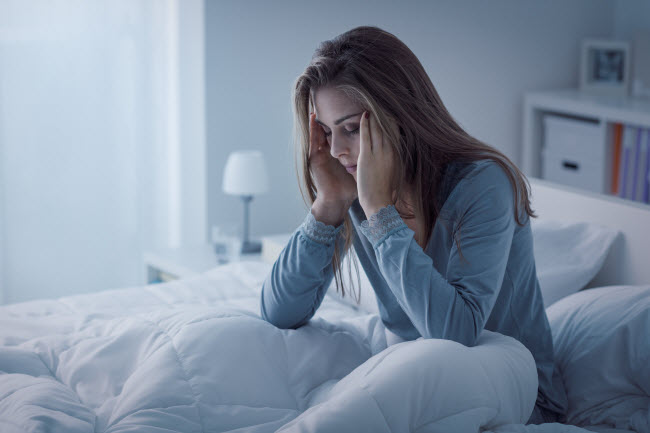Few things in life are more frustrating than tossing and turning in bed when all you want is sleep.
In fact, more than one-third of Americans do not get the recommended amount of nightly sleep – seven hours– necessary for maintaining good health, according to the U.S. Centers for Disease Control and Prevention.
The next time a bout of insomnia seizes you, do something counterintuitive: Get up.
“If you get up, your mind will kind of disengage from the stress of not sleeping and focus on something else,” says Mary Helen Rogers, vice president of communications for The Better Sleep Council.
Rogers recommends quietly climbing out of bed and going to a different room. “Maybe have a cup of tea in a soft light and then come back to bed after a few minutes,” she says.
Other variations on this technique include briefly rising and:
- Resetting your aroma therapy
- Reading a couple of pages from a book
- Engaging in deep-breathing techniques
“It doesn’t have to be for 20 or 30 minutes,” she says. “It can be just get up, have a tiny drink of water or maybe use the restroom.”
By removing yourself from your bed and then returning, you give the body a “re-do” that often will help you fall asleep, Rogers says.
Natural ways to sleep better
For many people, a few hours of insomnia is a rare exception. But millions of others struggle night after night to finally drift off to dreamland.
If you are one of these restless sleepers, bigger changes may be in order. “You need to start looking back a few hours – what are you doing leading up to bed?” Rogers asks.
The key to better sleep is to make sure you don’t “increase your body’s energy instead of decrease it” before bedtime, she says.
“Today’s society is so plugged in,” Rogers says. “We are 24/7 communicating with each other, we are 24/7 receiving information. The amount of time that the average person disengages has decreased dramatically.”
So, avoid things that wind you up, such as drinking caffeinated beverages or participating in strenuous exercise in the hours leading up to bedtime. Also, avoid heavy eating and alcohol consumption.
Instead, plan things that will increase relaxation. For example:
- Take a warm shower before bed
- Drink a cup of chamomile tea
- Engage in light stretching
- Meditate
- Scribble in an adult coloring book
- Write down thoughts for the day in a journal
- Prepare a “to-do” list for the following day
“If you want to do something, go old-school: Get a book, get a magazine,” Rogers says.
The danger of light
Too much light – specifically, blue light – also can keep you awake.
“A lot of the homes and a lot of the new gadgets today have LED lighting,” Rogers says. “That blue light is really disruptive to your sleep patterns.”
Rogers says nightlights or bedside lamps should have an amber or yellow backlight. Also don’t overlook other sources of blue light, such as your digital alarm clock, the power button on your television or other power indicators.
“It may seem small, but while you’re sleeping that tiny bit of blue light actually can penetrate and impact how you’re sleeping,” she says.
So, consider blocking those blue lights with a piece of masking tape or other covering.
“Charge your electronics in the living room, or the kitchen or a spare room,” Rogers says, adding that doing so also makes it less tempting to “jump on the iPad or jump on the laptop one last time” before bed.
Establishing the right sleep environment
Finally, creating the right rituals and environment can help facilitate sleep.
Rogers suggests scheduling your bedtime and sticking to that time every night.
“Set an alarm on your phone that says, ‘OK, now it’s time to start getting ready for bed,’” Rogers says.
Also, take an inventory of your sleep environment and makes sure your sleep set-up invites you to slumber rather than keeping you awake. Ask yourself:
- How does my mattress feel?
- Are my pajamas comfortable?
- Does my pillow feel right?
Most people also keep their rooms too warm at night, Rogers says. “Your bedroom should be anywhere from 65 to 68 degrees,” she says. “The most comfortable sleep comes from a cool head and warm feet.”
Clutter also can keep you from feeling relaxed enough to fall asleep.
“You’ve got laundry stacked up, or that suitcase that you never unpacked from vacation, or that messy desk in the corner – those things can really keep your mind from disengaging and relaxing,” Rogers says.
Related product:





